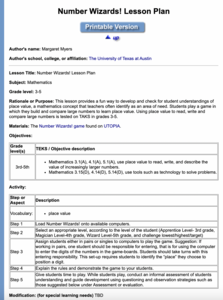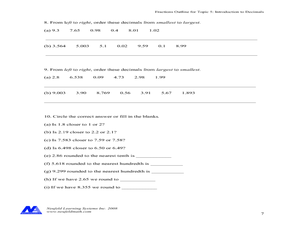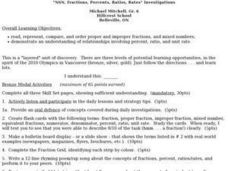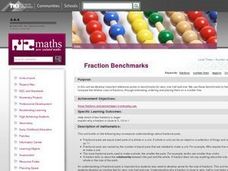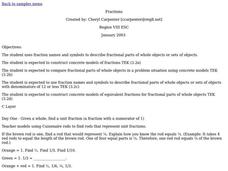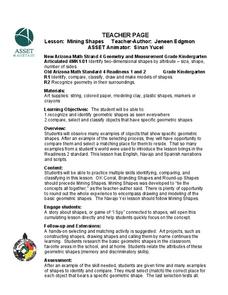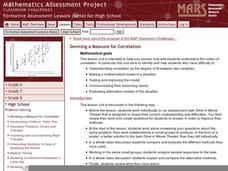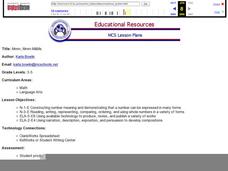Curated OER
Number Wizards! Lesson Plan
Young scholars play a game in which they build and compare large numbers to learn place value. They use place value to read, write and compare large numbers.
Curated OER
Understanding Fractions - Cookbook Comparisons
Learners explore equal fractions in relationship to a whole unit. They fold strips of paper into halves, thirds, etc. and compare them to the first strip which represents a "whole unit." Fractional parts are identified and compared.
Curated OER
Introduction to Decimals
Young math whizzes complete the online instruction, then solve 20 problems about identifying decimals, comparing decimals and fractions and ordering decimals.
Curated OER
Teddy Bears and Friends
Children begin by making direct comparisons between objects and putting a number of objects into order according to length. They are also introduced to measuring with multi-link cubes which allows them to compare objects which cannot be...
Curated OER
Does Sunlight Effect Leaf Size?
Students make estimates and then measure leaves for accuracy. They calculate the area of the leaves by drawing an outline on graph paper and counting the squares. They compare the leaves exposed to sunlight to those that are in constant...
Curated OER
Study Buddies: Dividing by One-Digit Divisors
Fourth and fifth graders learn long division by one digit divisors. They learn the steps: divide, multiply, subtract, compare, bring down, repeat. Pupils solve five problems in a step by step format.
Curated OER
Building Sets of 13 and 14
Compose and decompose sets of 13 and 14 and compare sets of each with your little learners. They use objects to construct sets of 13 and 14, record their answers, and compare sets in several different ways.
Curated OER
"NSN, Fractions, Percents, Ratios, Rates" Investigations
Sixth graders engage in an investigation about the concepts related to fractions. They read, represent, compare, and order proper and improper fractions, and mixed numbers. They demonstrate an understanding of relationships involving...
Curated OER
Fraction Benchmarks
Learners investigate the fraction benchmarks for zero, one half, and one. They use these benchmarks to compare the relative sizes of fractions, through estimating, ordering and placing them on a number line. An assessment worksheet is...
Curated OER
Research Lesson
Once you have introduced the concept of comparing positive fractions, use this plan to further understanding. Pupils will start mixing positive and negative fractions through various learning activities. Note: Adapt this lesson plan to...
Curated OER
Number Sentences
Fifth graders become familiar with problem solving strategies of guess and check and working backwards. They demonstrate the basic concepts of addition, subtraction, multiplication, and division using a math sentence.
Curated OER
Fractions
Young mathematicians use fraction names and symbols to describe fractional parts of whole objects or sets of objects. They construct concrete models of fractions, and compare fractional parts of whole objects in a problem situation using...
Curated OER
Introduction to Equivalent Fractions
Explore equivalent fractions! Youngters measure the crown of their head with adding tape labeled with various fractions and fractional parts, and compare strips to notice numerical relationships. They fold adding tape in half and color...
Arizona State University
Mining Shapes
Youngsters recognize and identify shapes. They draw, and use modeling clay to make shapes. They also identify shapes in their environment and in the Navajo culture, then compare the shapes and sort them into groups. This is the...
Curated OER
Absolute Value Bingo
Students explore some different concepts in relation to using a number line for instruction. Given some number values, they graph the position on the number line. The lesson ends with them playing Bingo.
Curated OER
Measuring Beads
Young scholars compare the weight of the students's favorite soft toys directly and then indirectly using beads.
Curated OER
Grab a Handful and Count
Let's use Fruit Loops to teach counting skills! Learners practice counting one-to-one correspondence using Fruit Loops with a partner and then compare them to see who has more or less.
Curated OER
Lotto or Life: What Are the Chances?
Though the website does not seem to have the mentioned video, a reding and lottery style games simulate the chances of finding intelligent life somewhere other than Earth. Without the video, this lesson is short, but it can be a useful...
Curated OER
A Statistical Study of the Letters of the Alphabet
Students gather appropriate information for simple statistical analysis. Then they will calculate probability working with a piece of literature that makes this lesson ideal for teaching across the whole curriculum.
Curated OER
Devising a Measure for Correlation
How well does your class understand the concept of correlation? Use an activity to explore different methods of calculating correlation. Working alone and then in groups, your class will make decisions on what math to apply to the...
Curated OER
Worksheet Chapter 1 College Prep Algebra
In this algebra worksheet, students compare integers, translate words to a numerical expression, identify sets of numbers, identify properties, use order of operations, multiply fractions, and solve simple word problems. This 13 page...
Curated OER
Big Boats Up The River
Using boats along in the Port of Albany as the focus, learners practice adding single-digit numbers and interpreting data. This instructional activity comes with the worksheets, resource links, and other materials to make it a worthwhile...
Curated OER
Mmm, Mmm, M&M's
Here is another version of the classic M&M math lesson plan. In this one, upper graders utilize the ClarisWorks Spreadsheet program in order to document the data they come up with from their bags of M&M's. After making their...
Curated OER
Relations
Students identify, compare, and analyze shapes and numbers. In this analogies and comparison math lesson, students warm up by completing 4 worksheets to familiarize themselves with analogies. In small groups, students are challenged to...


